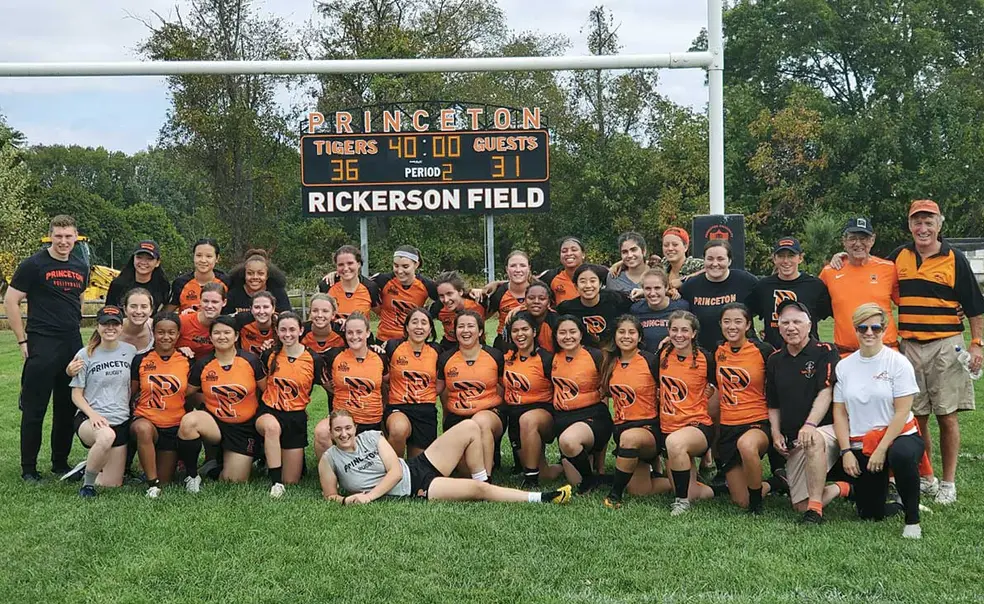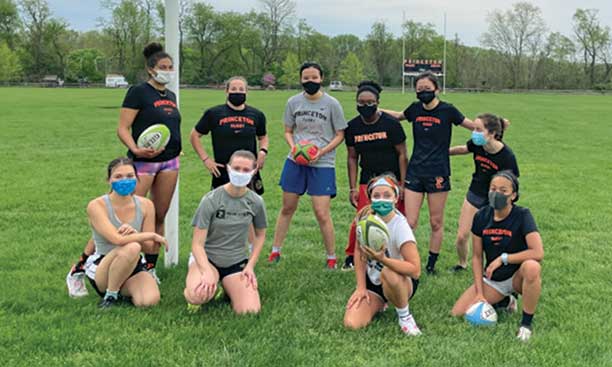Women’s Rugby Goes Varsity
In 2022–23, rugby will become Princeton’s 18th women’s varsity sport
When Princeton’s campus recreation office asked for a meeting with the women’s rugby team late this spring, club president Frances Walker ’22 had a feeling her players were about to get the big news they’d been waiting for.
“You don’t put everyone on the call to tell them bad news,” Walker says. She was right: The athletics department had decided to promote the women’s club rugby team to the status of a varsity sport. “It was on Zoom, so I was just, like, doing fist pumps and silent things because I had my mic off… It was really, really exciting.”
The club team was founded in 1979 and has competed under the national governing body, USA Rugby. In 2022–23 it will become Princeton’s 18th women’s varsity sport. The change has been a few years in the making — the club’s captains first proposed the varsity idea in the 2017–18 season.
Since then, Walker says, the team has met with athletics and other University administrators and has received support from the rugby board, alumni, varsity rugby programs at other schools, and Princeton varsity teams.
“The team was intentional about becoming a varsity program,” says Walker. “We really wanted to maintain a high level of rugby and also increase our skills, and we felt that becoming varsity was one of the best ways to do that, as well as opening up the sport for more accessibility, more funding, different types of players, more players, that sort of thing.” The men’s club rugby team has not created a petition for varsity status and will remain a club sport.
Women’s rugby will now have a full-time head coach — the University is planning a national search — and the opportunity to support a few students through the recruiting process, says Mollie Marcoux Samaan ’91, outgoing director of athletics. The team will also have continued access to athletic medicine, as well as strength and conditioning support.
“They’ve had just a tremendous history of not just education through athletics but of competitive success,” Marcoux Samaan says, describing the reasons behind the team’s elevation. “They have a great alumni base and strong community of people supporting them, and we thought it was an opportunity to provide additional mentorship and empowerment and growth for women on our campus.”
The decision came during the 50th anniversary of women’s athletics at the University. Only three other Ivy League schools — Brown, Dartmouth, and Harvard — have varsity women’s rugby teams, which means the sport is one school shy of being able to name an Ivy League champion. But the University’s team will still compete against 26 other schools, including those three Ivies, as part of the National Intercollegiate Rugby Association.
“To me, it is absolutely critical that we provide an equitable experience for our female student athletes, and we are very committed to that on many, many levels,” Marcoux Samaan says. “I think this is an additional opportunity for women to learn through sports.”













1 Response
Stanley M. Hunting ’58
4 Years AgoMen’s Varsity Rugby?
There should also be a men’s varsity rugby team, or are your male admitted students of late too wimpy to form a decent men’s varsity rugby team? A fair question, but PU admissions doesn’t care, more than likely.
Their progressive attitude is why countless alumni of PU, and of all the Ivies, are turned off, and now will not give the money that they did faithfully for decades. But no more.
Even Eisgruber has become political, instead of focusing on education.